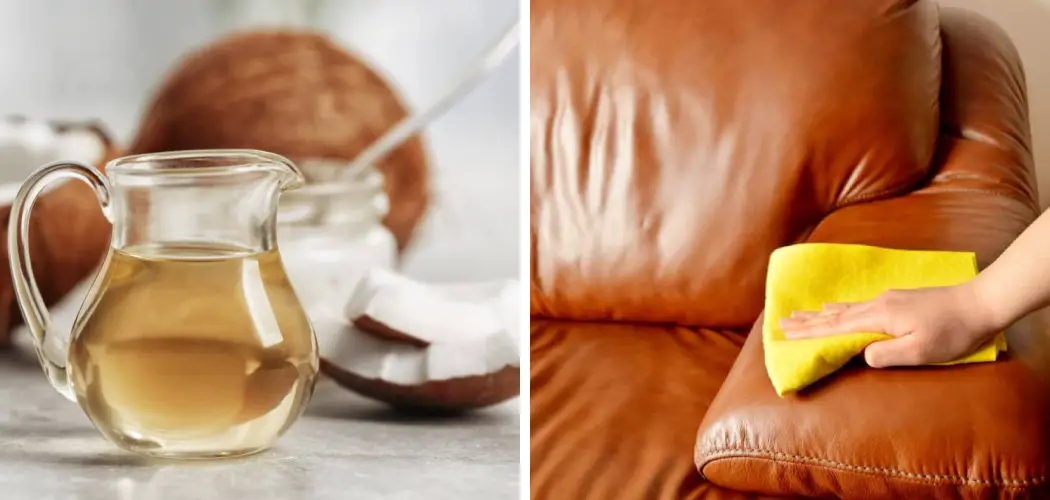Leather is a popular material for furniture and clothing. It’s strong, durable, and stylish. But what should you do if your leather starts to look dry or cracked? Some people recommend using coconut oil to restore the leather’s appearance and protect it from further damage. Is coconut oil good for leather, or should you avoid using coconut oil on leather altogether? Read on to find out more.
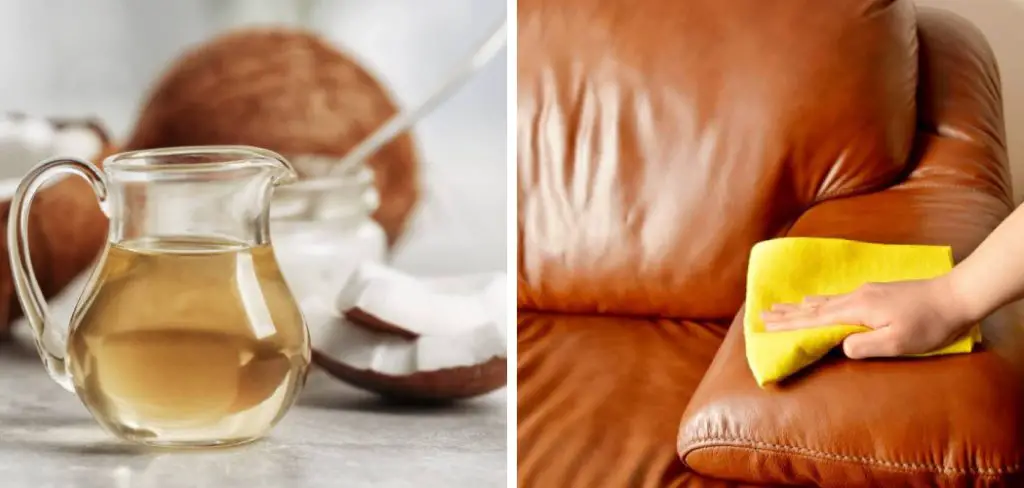
Summary: Coconut oil is a popular choice for leather care, as it is natural, sustainable, and easy to use. It helps to condition the leather, soften it, and keep it looking new while protecting it against dirt and grime. Coconut oil also gives the material a pleasant smell and can help to repel water. When applied in moderation, coconut oil effectively keeps your leather items looking great without compromising their quality or longevity.
Why Use Coconut Oil Good for Leather?
Leather is a popular material for clothing, furniture, and other household items. It is durable and has a unique appearance that many people find appealing. One of the best ways to keep leather looking its best is to oil it regularly. This helps to prevent cracking and keeps the material supple. Coconut oil is an excellent choice because it is affordable and easy to find.
In addition, it has natural moisture-resistant properties that help to keep leather looking good for longer. Apply a small amount of coconut oil to a clean cloth and rub it into the leather in a circular motion. Doing this once a month or so will help to keep your leather goods looking their best.
Is Coconut Oil Good for Leather: 5 Benefits
Coconut oil is a natural, plant-based oil with various uses. It can be used for cooking, skincare, haircare, and more. Coconut oil is also good for leather. Here are some benefits of using coconut oil on leather:
- Coconut oil is a natural conditioner. It helps soften and condition leather, keeping it looking healthy and shining.
- Coconut oil is a natural water repellent. When applied to leather, it helps to protect the material from water damage.
- Coconut oil can help to prevent cracking and drying of leather.
- Coconut oil is a natural UV protector. When applied to leather, it helps to protect the material from sun damage.
- Coconut oil is a natural dust repellent. When applied to leather, it helps to keep the material clean and free of dust buildup.
If you’re looking for a natural way to condition and protect your leather goods, coconut oil is a great option. It’s easy to use and is readily available at most stores.
Cleaning Leather with Coconut Oil Step by Step Guide
Step 1: Determine
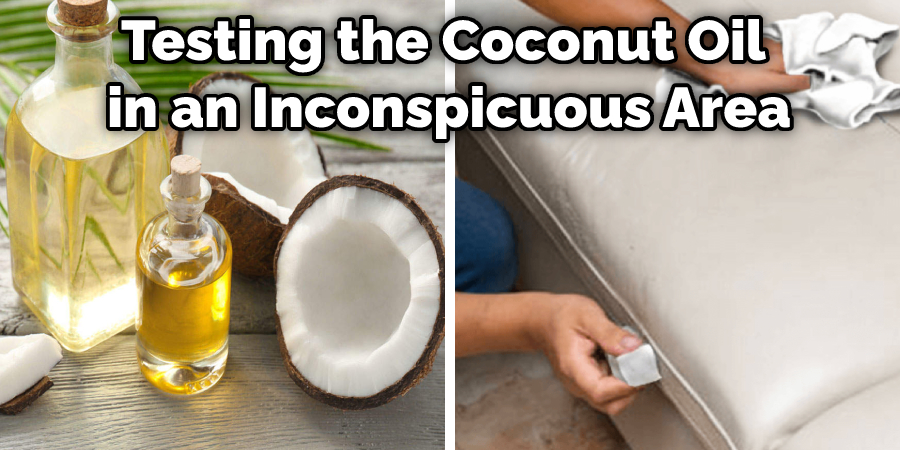
If your piece is made of genuine leather, you can proceed to the cleaning process. However, if it is faux leather, you should care as some products may damage the material. In this case, we recommend testing the coconut oil in an inconspicuous area before proceeding.
Step 2: Prep the Area
Start by vacuuming the piece to remove any surface dirt and debris. If there is any caked-on dirt, use a damp cloth to wipe it away. Once the area is clean, allow it to dry completely.
Step 3: Apply Coconut Oil
Now that you’ve prepared both your leather item and the coconut oil, it’s time to apply the oil. Like any other type of moisturizer, you’ll want to start by applying a small amount of oil to a test area. This will help you gauge how well your leather can absorb the oil without looking or feeling greasy.
Apply it to the entire surface once you’ve determined that your leather can handle the oil. You can use your hands, a soft cloth, or even a brush to work the oil into the leather. Be sure to pay special attention to any dry or cracked areas.
Step 4: Wipe Away Excess Oil
Once you’ve applied a generous amount of oil to your leather, it’s time to wipe away the excess. Use a soft, clean cloth to remove any oil sitting on the leather’s surface. You don’t want to leave any oil behind, as this can cause staining or other damage.
Step 5: Let the Oil Sink In
After removing the excess oil, let your leather item sit for a few hours or even overnight. This will give the oil time to sink in and condition the leather. Once the oil has had a chance to soak in, you can use your leather item as usual.

Step 6: Enjoy Your Clean Leather!
Assuming you followed all of the steps correctly, your leather should now be clean and look great! Be sure to moisturize it regularly to keep it from drying out and cracking. You can use coconut oil for this – be sure to test it in an inconspicuous area first, as some oils can darken leather. If you want to know more about is coconut oil good for leather, keep reading.
How To Apply Oil To Leather Cleaning Leather with Coconut Oil?
It is an effective, all-natural way to clean and polish your leather furniture. The lauric acid in coconut oil is antibacterial and antimicrobial, making it great for preventing mold and mildew from growing on your leather. Coconut oil is also hydrating, so it will help keep your leather furniture from drying out and cracking over time.
To clean your leather furniture with coconut oil, start by wiping down the surface with a dry, soft cloth to remove any dust or dirt. Then, heat a small amount of coconut oil in a microwave-safe dish for about 20 seconds or until it is liquid. Next, dip a clean cloth into the coconut oil and rub it into the leather in a circular motion.
Continue rubbing until the leather is evenly coated with a thin layer of oil. Let the oil soak into the leather for about 30 minutes, then buff it dry with a soft cloth. Your furniture should be clean, hydrated, and protected from future damage!
Leather Conditioning Based on Type of Leather
There are three main types of leather used in furniture: aniline, semi-aniline, and protected.

Aniline leather is the most natural and softest type of leather. It is dyed with soluble dyes without covering the leather with a topcoat paint or pigment. Because it is not coated, it is more susceptible to staining and fading.
Semi-aniline leather is also dyed with soluble dyes, but it has a light surface coating that makes it more resistant to staining and fading.
Protected leather is the most durable type of leather. It is coated with a pigmented lacquer or polymer that gives it a consistent color and makes it resistant to staining, fading, and wrinkling.
Coconut oil is good for leather because it can help restore its natural oils. Leather is made of protein fibers, which can become dry and brittle over time. Coconut oil can help replenish these lost oils, making the leather more supple and pliable. In addition, coconut oil can help to protect leather against water damage and staining.
How to Condition Leather with Coconut Oil
Coconut oil is a natural product that can be used to condition leather. It is absorbed quickly by the leather and helps to soften and protect it. You can use coconut oil on any type of leather, including furniture, clothing, and accessories.
To condition leather with coconut oil, you will need:
- Cocoa butter
- Olive oil
- Lemon juice
- Coconut oil
- A clean cloth
Making the Conditioner
Step 1: Melt Coconut Oil and Beeswax
To make the leather conditioner, start by melting the beeswax and coconut oil together. You can do this in a double boiler or a bowl set over a pot of simmering water. If you’re using a bowl, make sure it’s heat-safe.
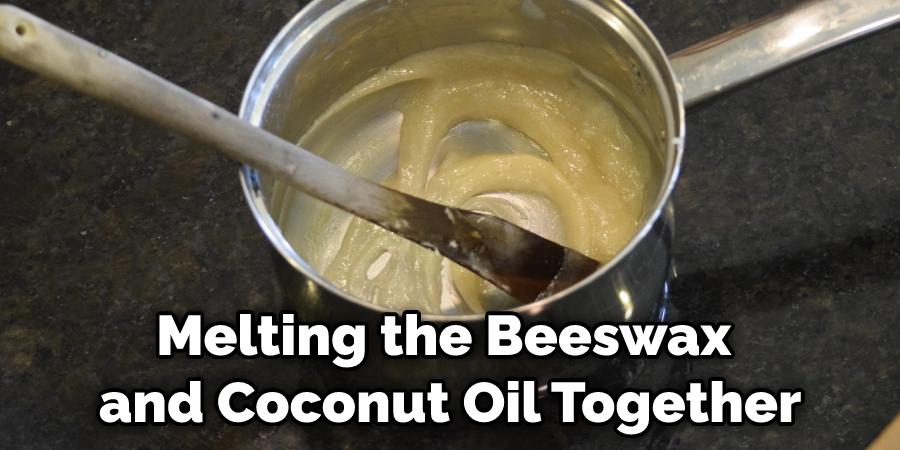
Step 2: Add Essential Oils
Adding essential oils is completely optional, but it can give your furniture polish a nice scent. If you choose to add essential oils, start adding ten drops to the jar. You can always add more later if you want a stronger scent. Some great essential oils to use for furniture polish are lemon, lavender, and peppermint.
Step 3: Add Sweet Almond Oil
If you want to add extra shine and protection to your leather, sweet almond oil is a great option. Add a few drops to your coconut oil and mix well before applying. You can also use this oil on its own if you prefer.
Step 4: Add Castor Oil
Castor oil is another natural oil that is good for leather. It is known for its lubricating properties, which can help keep the leather from drying out and cracking. Add a few drops of castor oil to a clean cloth and rub it into the leather or simply mix with your conditioner. You can also find castor oil at most health food stores.
Step 5: Pour Into the Container
When you’re happy with the consistency of your mixture, pour it into a container for storage. You can use any container, but make sure to label it clearly to know what’s inside.
Coconut oil is solid at room temperature, so if you live in a warm climate, you may need to store it in the fridge to prevent it from melting. Keep reading for more information about is coconut oil good for leather.
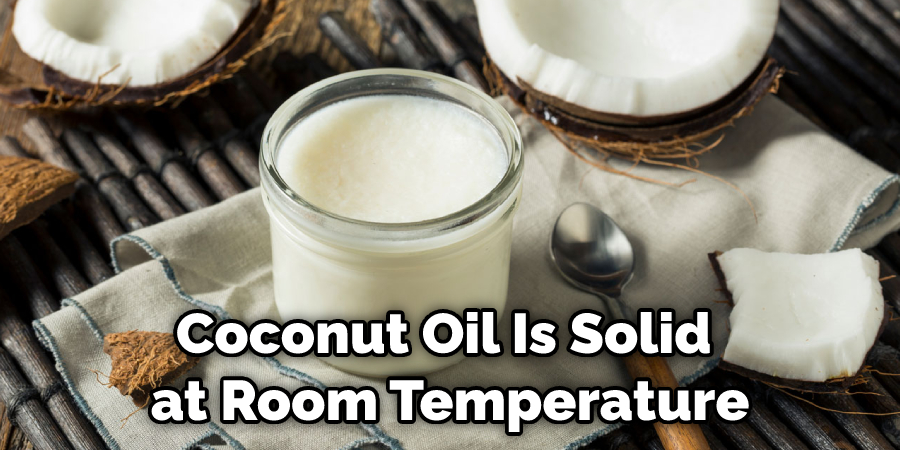
Using the Conditioner
To use the coconut oil conditioner, massage a small amount into clean, dry leather. Rub it in using circular motions, and pay special attention to any cracked or dry areas.
Let the conditioner soak in for at least 15 minutes before buffing it off with a soft cloth. Your leather should feel softer and more supple after just one treatment.
For best results, apply the conditioner once a week. You can also use it as needed to spot-treat dry areas. Coconut oil is an excellent natural conditioner for leather. It’s packed with nutrients that help keep leather soft, supple, and healthy, and it can also help repair the damage.
Choosing the Right Coconut Oil for Leather Furniture, Shoes, and Clothes
There are many different types of coconut oil, and each has its benefits and drawbacks. For example, virgin coconut oil is the most natural form of oil and is the most beneficial for skin health.
However, it is also the most expensive type of coconut oil. Refined coconut oil is less expensive and has a longer shelf life, but it is not as effective in moisturizing the skin. Fractionated coconut oil is a type of refined coconut oil that has been treated to remove certain fatty acids.
This makes it lighter in texture and less likely to clog pores, making it a good option for those with oily skin. When choosing coconut oil for leather furniture, shoes, or clothes, it is important to consider the type of oil that will be the most effective for the specific item.
Cons of Using Coconut Oil on Leather Furniture
Darkens the Color of Leather if Overused
Coconut oil is good for leather because it can help to preserve the material and make it more durable. However, if you use too much coconut oil, it can darken the color of your leather. So, be sure to use it sparingly.
Oil Stains Leather
Another downside of using coconut oil on leather is that it can leave behind oil stains. So, if you’re not careful, your leather may look dirty and stained.
Requires Regular Maintenance
Coconut oil is good for leather, but it does require regular maintenance. You’ll need to reapply the oil every few months to keep your leather looking its best.
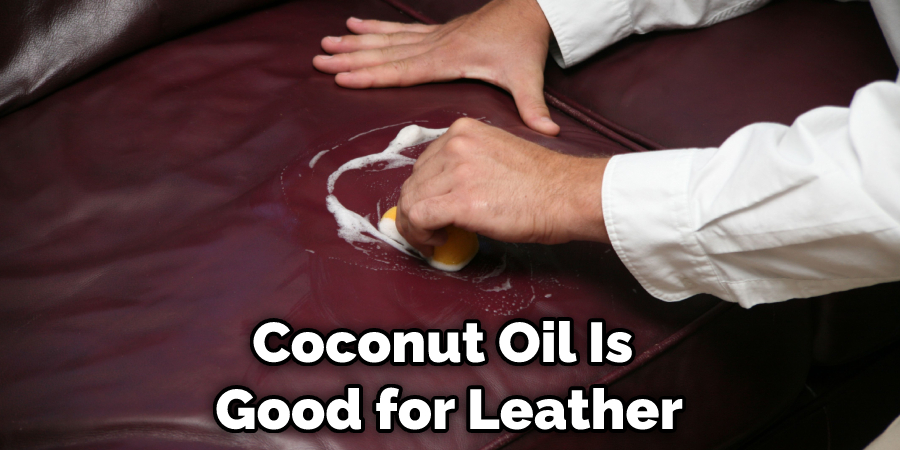
Overall, coconut oil is good for leather, but there are a few downsides to using it. Be sure to use it sparingly and regularly maintain your leather furniture to keep it looking its best.
Frequently Asked Question
Which Type of Coconut Oil Is Best: Liquid, Solid, or Dry (as a Cream)?
Coconut oil is great for leather because it is a natural conditioner. It will help to soften and protect the leather. You can use any coconut oil, but the liquid is the easiest to apply. If you have solid coconut oil, you can melt it before applying. Dry coconut oil can be used as a cream. Just apply it to the leather and rub it in. You can also use a cotton ball or cloth to apply the oil.
What Is the Difference Between Regular and Extra Virgin Coconut Oil?
Extra virgin coconut oil is made from pure, fresh coconut milk that has not been exposed to heat. It is the highest quality coconut oil and has the most nutrients. Regular coconut oil is made from dried coconut meat that has been exposed to high heat.
Should I Buy Organic or Non-Organic Coconut Oil?
There is no definitive answer as to whether or not organic coconut oil is better than non-organic coconut oil. Some people believe that the nutrients and antioxidants present in organic coconut oil make it healthier. In contrast, others believe that the pesticides used in non-organic coconut oil can be harmful. Ultimately, it is up to the individual to decide which type of coconut oil is right for them.
Conclusion
Coconut oil is a great natural leather conditioner that can help keep your furniture looking new. Apply it every few months to keep your leather soft and supple. Thanks for reading our post about is coconut oil good for leather?

